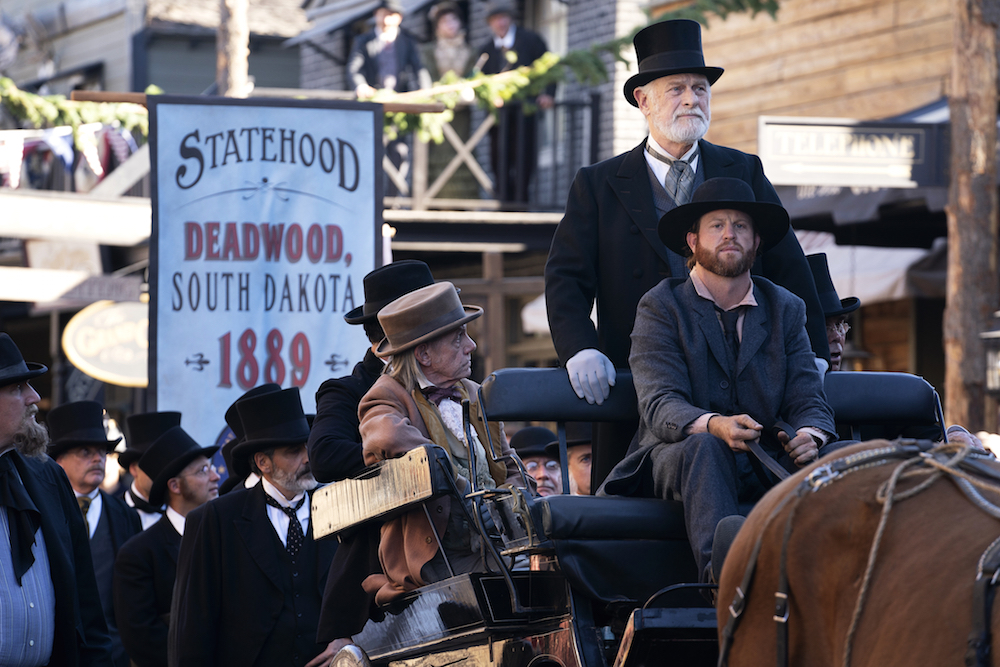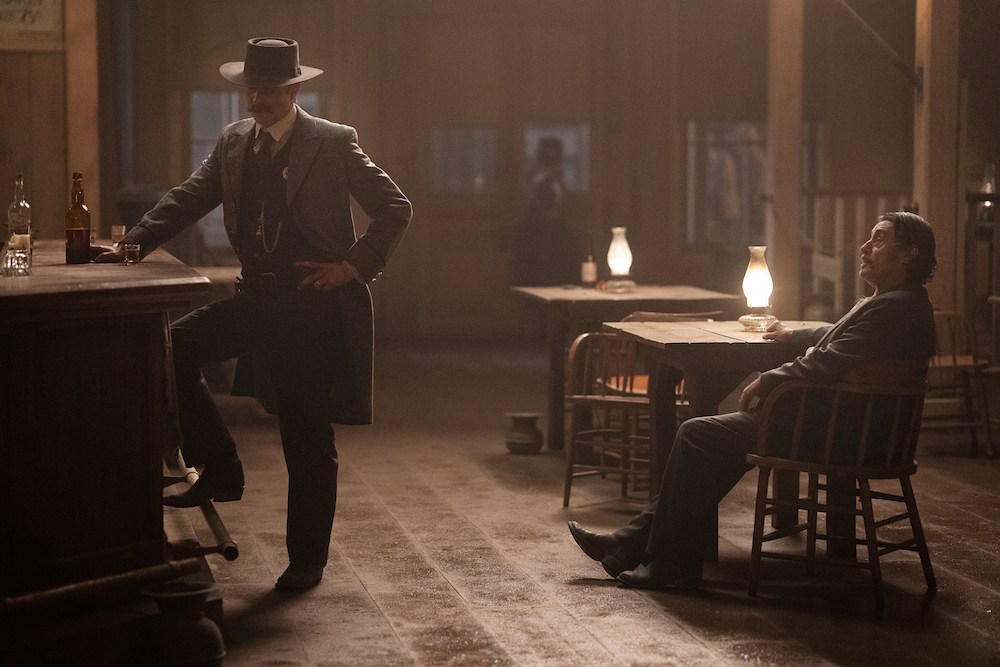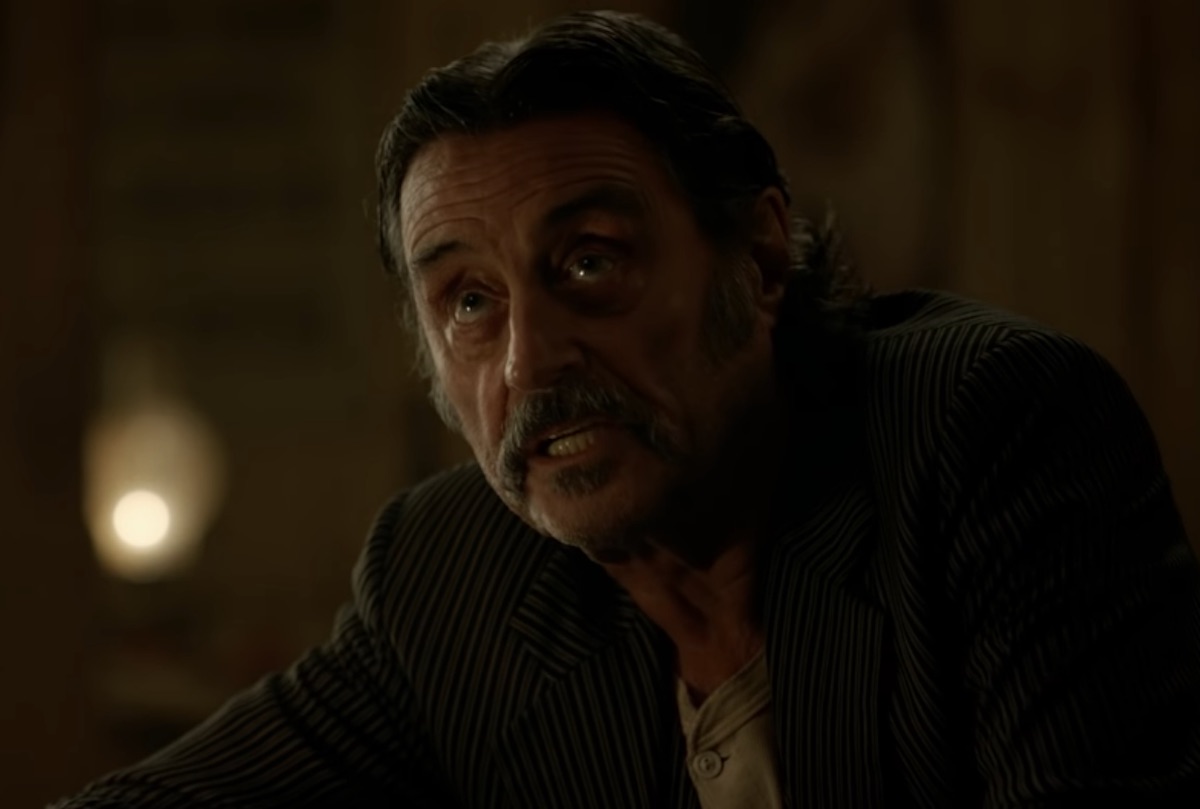Deadwood’s original run ended with its chief protagonist Al Swearengen (Ian McShane) alone on his hands and knees, scrubbing the blood of a murdered prostitute from the floor of his saloon office. Shortly before, his employee Johnny Burns (Sean Bridgers) had asked him if the woman suffered when her throat was cut. “I was gentle as I was able, and that’s the last we’ll fucking speak of it, Johnny,” Swearengen said, prompting his heartbroken underling to leave the room. “He wants me to tell him something pretty,” Swearengen observed to no one, as the blood began to lift from the floorboards—not dissipating, exactly, but foaming up around him—the stain of his own labors. On that note, the show faded to black.
The last episode of Deadwood’s third season was not planned as a series finale, but it worked well enough as one, providing a satisfying, if sudden, resolution for a major plot arc (the blood-soaked appeasement of the vengeful tycoon George Hearst [Gerald McRaney], allowing the town to remain largely intact) and serving as a tidy summation of creator and writer David Milch’s recurring themes. Still, there was much left unsaid, and so 13 years after the finale—and 12 years after two Deadwood films were first announced and subsequently shelved—fans finally have a true conclusion to the saga of Swearengen and the town he keeps running by any means necessary, in the form of the appropriately titled Deadwood: The Movie.
Over three seasons, Deadwood chronicled the brutal development of a micro-civilization, maintaining a profane but always humanistic tone that resembled nothing else on television at the time. Its fictional scenarios were inspired by true American history featuring places that really existed—Deadwood itself—and reimaginings of real-life figures like Wild Bill Hickok and Calamity Jane. Under Milch’s stewardship, its cast of criminals, misfits, entrepreneurs and gamblers slowly turned a makeshift, lawless gold mining camp into a community with codes, rules, and set power structures. There were horrific deaths and pointless tragedies, always stemming from the chase of elusive Dakota territory gold, but the show was ultimately optimistic. Mutual self-interest, Milch argued over the course of the series, is the principle upon which our country, and all human cultures, are based. Society emerges from the chaos because it has to.
For all Al Swearengen’s corrupt ruthlessness—the murder that closed the series was only one of at least 15 he permitted, ordered, or committed over the course of the show’s run—he is a pragmatist. He knows that whatever he’s built, through violence, theft, and other vices, is worthless without the burgeoning, strangely logical structure of the Deadwood community. Swearengen eventually realizes that he needs his natural foe, the morally upstanding but temperamental hardware store owner Seth Bullock (Timothy Olyphant) to be the town’s lawman; he needs the fussy socialite Alma Garret (Molly Parker), whose husband he had murdered, to maintain and grow the gold claim that eventually underwrites the town’s first bank; he even needs the shifty eyes and filthy ears of Deadwood’s clammy hotelier (later honorary mayor) E.B. Farnum (William Sanderson) to bring him quasi-accurate news reports from the places he can’t, or refuses to, go. Likewise, Deadwood’s inhabitants grow to respect Swearengen as a leader and strategist, recognizing that he has a cunningness and big-picture vision that they largely lack.
https://www.youtube.com/watch?v=s0WrXmhvXTA
HBO’s new Deadwood film picks up ten years after the events of the finale, on the day of the ceremony recognizing South Dakota as a state. As in the pilot, we enter Deadwood in the boisterous company of Calamity Jane (Robin Weigert) riding drunkenly into town, though this time she is proclaiming loudly her intentions to see her former lover Joanie Stubbs (Kim Dickens) and visit the grave of her old traveling partner Wild Bill Hickok. We see Bullock, now a middle-aged U.S. Marshal and hotel owner, eating breakfast with his family before the ceremony. Alma Ellsworth and her now-teenaged ward Sofia return to town via train. Almost everyone whose name viewers will recall from the series (“Doc” Cochran, E.B. Farnum, Trixie, Sol Star, Charlie Utter, and many others) is alive and still living in the camp. Al Swearengen is too, though he appears to be dying there. In an early scene, Doc Cochran diagnoses him with what sounds like acute liver failure. Of course, the beloved supporting cast isn’t the only thing popping up in town: a decade after Swearengen memorably bemoaned the arrival of telegraph lines, telephone poles are now being erected too. Every business will soon have one, as one character observes.
A parade honoring the new state and visiting California Senator George Hearst (last season’s villain, returned for the festivities as he still holds extensive claims in the area) is derailed briefly by an agitated Trixie (Paula Malcomson). The former prostitute-turned-love-interest of Bullock’s business partner Sol Star (John Hawkes) loudly berates the senator for his past crimes in the camp. The outburst jars Heart’s memory of the events of ten years ago, prompting him to realize that the revenge he demanded (Trixie’s corpse, in retribution for shooting him) was not quite what he received (the corpse of a similar-looking woman, whose blood we left Al cleaning in the final moments of the series). Within hours of the parade, a failed real estate deal ends with a murder.
Without a 12-hour season for the story to luxuriate in, the film moves quickly from there, with only brief digressions to catch us up on richly realized, non-central personalities like Wu (Keone Young), the leader of the camp’s Chinese population, whose character development at the margins of the story helped Deadwood’s fictional universe feel satisfyingly complete. Only one new character is introduced, barely, and for good reason; with such a sweeping cast already, there’s no time for fresh character development. Everyone from the series is essentially the same personality-wise, if older, and, in the case of Swearengen, ill. In short order–the film is just under two hours long–there’s a murder, a birth, a funeral, a wedding, a prison break, and a hanging. (Actually, two from that list are merely attempted). Some past relationships are rekindled; others are painfully ignored; none are substantially advanced.
 recent New Yorker story about David Milch, his daughter Olivia, herself a screenwriter, declared that her father “doesn’t really write movies.”
recent New Yorker story about David Milch, his daughter Olivia, herself a screenwriter, declared that her father “doesn’t really write movies.”
“He does long-form character development,” she said. “I’ve always said that he writes novels set like plays, and shot like movies, that air on television. What he does is its own thing, but he definitely doesn’t do three-act structure, where everything resolves itself by the end.”
In that regard, the movie holds true. Its structure and the speed at which it moves positions it as an addendum to the series more than anything that could stand alone. The vast complexity of the characters is alluded to—mostly successfully—rather than built upon, and the plot only holds up if you don’t stop to think about it too hard (Hearst’s descent into micromanaging, cartoon-villain territory is particularly hard to swallow). But these quibbles are outweighed by the pleasure of returning to the world of Deadwood, which feels as real and all-encompassing as it did during the series. What could easily be dismissed as cheap fan service in lesser hands feels earned in Milch’s; the characters haven’t been revived as a pandering gesture to vocal petition signers or outraged Redditors but instead out of what feels like a true love for them from their creators—no one seems more enamored and concerned with their fates than Milch.
The New Yorker piece focuses primarily on Milch’s recent revelation that he, like Al Swearengen, is suffering from a potentially terminal disease. He was diagnosed with Alzheimer’s in early 2015, and in the years since, he has spent his newly limited creative energy working on the Deadwood script, which HBO finally greenlit last summer. While watching the movie, it’s hard not to draw parallels between the respective fates of Milch and Al Swearengen, his greatest fictional creation. Though Milch continues to work, the Deadwood film will almost certainly be one of his final finished projects.
“I have disabused myself of any thought of a normal future, but I allow myself a provisional optimism about the possibilities of what time I will be allowed,” Milch told the New Yorker. “And I’m determined to experience what life will allow me. I know I have a short while possible to me, but I don’t want to constrict or profane that with recrimination or a distorting bitterness. And I permit myself a belief that there is possible for me a genuine happiness and fulfillment in my family and the work I do.”
Swearengen’s determination to see his schemes through to the end mirrors Milch’s own process. In many ways, the town of Deadwood is both men’s life’s work. Without giving too much away (and with all due respect to Milch’s daughter), the two shepherd it to a satisfying, if overly tidy, resolution. While threats of future horrors still loom at the end of the film, fans get the goodbye to the story and its characters that the series finale failed to provide. Milch—who, ten years ago, left Swearengen bloodied on the floor, refusing to say “something pretty”—has given his audience, and perhaps himself, just that: a happy ending.





